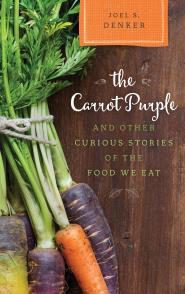The Carrot Purple
And Other Curious Stories of the Food We Eat
By Joel Denker
 About The Carrot Purple
About The Carrot Purple
How many otherwise well-educated readers know that the familiar orange carrot was once a novelty? It is a little more than 400 years old. Domesticated in Afghanistan in 900 AD, the purple carrot, in fact, was the dominant variety until Dutch gardeners bred the young upstart in the seventeenth century. After surveying paintings from this era in the Louvre and other museums, Dutch agronomist Otto Banga discovered this stunning transformation. The story of the carrot is just one of the hidden tales this book recounts. Through portraits of a wide range of foods we eat and love, from artichokes to strawberries, The Carrot Purple traces the path of foods from obscurity to familiarity.
Praise for The Carrot Purple
Joel Denker’s breadth of knowledge is dazzling, his stories are packed with jewels of information, captivating, and amusing. Reading them is pure delight.
— Claudia Roden, food writer; author of The New Book of Middle Eastern Food, The Food of Spain, The Food of Italy, and The Book of Jewish Food
The Carrot Purple is a classic Denker product. Smart, intriguing, and elegantly delivered. Every chapter is a surprise and a surprisingly subtle argument about change and global flows that has shaped peoples’ food habits as much as roots and tradition. Denker takes academic research in various fields – botany, cultural studies, and history – extracts its essence and sharpens its delivery to the great pleasure of the reader, the eater, and the cook.
— Krishnendu Ray, Chair, Department of Nutrition, Food Studies & Public Health, New York University; President, Association for the Study of Food & Society
Joel Denker’s smorgasbord of historical essays about common and curious plant foods (and spices) that Americans eat every day makes for an uncommonly good meal for the mind. Well researched and wonderfully written, this popular history is as good, highly informative, and fun as it gets. Now, to find some purple carrots!
— Bruce Kraig, food historian; co-author of Man Bites Dog: Hot Dog Culture in America and co-editor of Street Food around the World: An Encyclopedia of Food and Culture
Mr. Denker has a searching mind, and a busy pen. Now he has given us a culinary syllabary. The Carrot Purple and Other Curious Stories of the Food We Eat offers readers a savory taste of just about everything, from anise and arugula to walnuts and watermelon. There is lots in between, set before us with the flavors of history and geography. If you have ever wondered idly why you have never seen a purple carrot, this is where you will find the answer.
— Sidney W. Mintz, anthropologist, Johns Hopkins University; author of Sweetness and Power
Reading Joel Denker’s zingy sketches of some taken-for-granted fruits, vegetables, and spices is like meeting fifty interesting people at a party and listening to a well-connected friend dish about each of them — “You want to know who climbed in bed with who before strawberries hit the charts?” “Arugula? Well, talk about nouveau riche!” For inquiring minds, the amply stocked bibliography is an added bonus.
— Anne Mendelson, culinary historian; author of Milk: The Surprising Story of Milk Through the Ages
Food historian Denker has compiled a fascinating collection of short essays on the history of many common fruits, vegetables, and spices in an effort to get readers to appreciate the fullness of these histories. He delves into each item’s historical importance, which cultures adopted it first, how it traveled, and what it was used for… The anecdotes are accessible and enjoyable, and he debunks popular misconceptions of how foods have achieved their present form.
— Publishers Weekly
Have you ever wondered where baby carrots come from? Denker (The World on a Plate) has the answer. Along with the secret origin of those vegetables, the author shares the backstories of 49 other foods in short essays aimed at a general audience. Readers will learn that asparagus is related to leeks and that the Mafia cornered the artichoke market in the 1920s, along with which herb is said to smell like a squashed bedbug (coriander) and what nut was known as Jupiter’s acorn (walnut). The essays delve into word origins, health properties (both proven and purported), preparation styles, and modern uses.
— Library Journal
The Carrot Purple Is Available from
Rowman & Littlefield (1-800-462-6420), Amazon.com, Barnesandnoble.com, and other online vendors in both hardcover, paper, and ebook.







